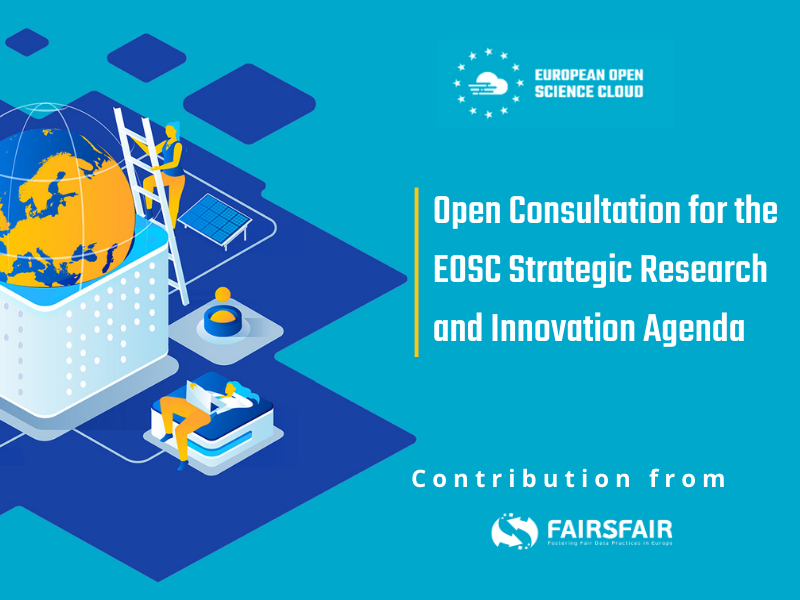
The recent open consultation on the EOSC Strategic Research and Innovation Agenda invited FAIRsFAIR and other European stakeholders and international bodies to contribute to the revisions to the document currently in place. An update of the SRIA will be presented at the EOSC Symposium this October. FAIRsFAIR took part in the open consultation by submitting a response which collected the input of the team members involved in the project.
EOSC Guiding Principles
FAIRsFAIR is a key contributor to the ongoing development of global standards for FAIR data and repository certification and to the policies and practices that will turn the EOSC programme into a functioning infrastructure. The project strongly endorses all of the guiding principles already identified as relevant to implementing the EOSC vision, with a special emphasis on the importance of FAIR-by-design tools. The guiding principles are a multi-stakeholder approach; data as open as possible and as closed as necessary; implementation of a Web of FAIR data and related services for science; federation of existing research infrastructures; and the need for machine-run algorithms transparent to researchers).
Action Areas
FAIRsFAIR rates as “highly relevant” all but four of the 14 action areas listed in the questionnaire, identifying three as deserving of particular attention:
- FAIRsFAIR views FAIR Metrics and Repository Certification as essential to driving a ‘bottom up’ dynamic where data owners are able to make their data more FAIR, and service owners can make their services more FAIR-enabling. However, there is an urgent need to raise both awareness and skill levels across disciplines in order to provide a solid foundation and avoid distorting the landscape. This proviso also applies to actions around rewards and recognition.
- Regarding Rewards and recognition, FAIRsFAIR notes that while currently these tend to focus on researchers, there are others who also contribute to and enable Open Science who also need recognition. As such, actions related to rewards and recognition need to take account of all roles within the research life cycle.
- Landscape Monitoring (Action Area 9) will be very relevant for targeting support for EOSC participation but will require a framework that enables an efficient and consistent way to assess and compare the policies of different stakeholders, for example Higher Education Institutes, funding bodies, repositories, publishers and research infrastructures.
On the topic of Identifiers (Action Area 1) FAIRsFAIR maintains that resolving the issue depends on attention first being directed towards the EOSC Interoperability Framework (Action Area 7). This is also true in the context of creating an Authentication and Authorisation Infrastructure (AAI) (Action Area 4).
Priorities
The SRIA associates priority tasks with each of the Action Areas listed. According to FAIRsFAIR, those tasks to be tackled at a disciplinary/domain level include:
- Priority 17: Develop Open Science training and professionalise associated roles
- Priority 19: Inform stakeholders about the developments in EOSC
- Priority 20: Widen EOSC stakeholder engagement in a strategic and timely manner. This is relevant in particular to the private sector stakeholders which could contribute to the requirements gathering for upcoming services and the business uptake.
Further comments are the following:
- Regarding Priority 2: Offer a common dataset search to enhance discovery via EOSC, while domain specific datasets are currently more developed, a focus on national solutions would promote out of silo thinking.
- Equally, Priority 3: Support communities to develop metadata standards and controlled vocabularies to enable all stakeholders to engage equally in EOSC would also benefit from national - and multilingual - input.
KPIs
The first of ten key performance areas listed in the current SRIA is that “researchers performing publicly funded studies should make relevant research results as openly available as possible”. In this regard FAIRsFAIR suggests that “relevant" be defined and also notes that whereas the SRIA text mostly refers to data and services, in reality outputs might include other research objects such as publications, which appear to be under-addressed in the document.
With reference to KPI 2 which relates to the presence of data stewards in research-performing organisations, FAIRsFAIR notes that the EOSC Skills & Training WG is preparing an entire list of professional functions encompassing roles well beyond data stewards and that these figures should also be taken into account.
Finally FAIRsFAIR suggests that "Open Science", referred to in KPI 3 be more clearly defined.
Alignment of EOSC and Stakeholder Needs
An important goal of the EOSC Partnership is to consolidate the Horizon 2020 research and innovation project outputs and support EOSC capacity building by aligning the activities of future Horizon Europe projects with the contributions from stakeholders creating the EOSC ecosystem. FAIRsFAIR recommends that the nascent RDA Communities of Practice (CoP) be considered in this context.
